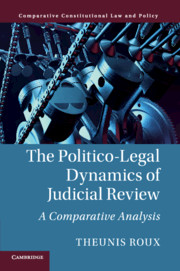52 results
Chapter 3 - Constitutional Populism in South Africa
- from I - Populisms
-
-
- Book:
- Anti-Constitutional Populism
- Published online:
- 24 March 2022
- Print publication:
- 31 March 2022, pp 99-137
-
- Chapter
- Export citation
3 - Marking Constitutional Transitions
- from Part I - The Problem of Transformation in Constitutional Design
-
-
- Book:
- From Parchment to Practice
- Published online:
- 28 February 2020
- Print publication:
- 30 April 2020, pp 53-75
-
- Chapter
- Export citation
11 - The Constitutional Court
- from Part III - Specialised Courts as Judicial Reform Strategy
-
-
- Book:
- The Politics of Court Reform
- Published online:
- 30 August 2019
- Print publication:
- 19 September 2019, pp 245-264
-
- Chapter
- Export citation
4 - From Democratic Legalism to Instrumentalism: India’s Constitutional-Cultural Transformation
-
- Book:
- The Politico-Legal Dynamics of Judicial Review
- Published online:
- 31 August 2018
- Print publication:
- 06 September 2018, pp 146-192
-
- Chapter
- Export citation
Acknowledgments
-
- Book:
- The Politico-Legal Dynamics of Judicial Review
- Published online:
- 31 August 2018
- Print publication:
- 06 September 2018, pp xiv-xvi
-
- Chapter
- Export citation
2 - A Typological Theory of JR-Regime Change
-
- Book:
- The Politico-Legal Dynamics of Judicial Review
- Published online:
- 31 August 2018
- Print publication:
- 06 September 2018, pp 49-90
-
- Chapter
- Export citation
3 - Australian Democratic Legalism: Constant Cultural Cause or Path-Dependent Trajectory?
-
- Book:
- The Politico-Legal Dynamics of Judicial Review
- Published online:
- 31 August 2018
- Print publication:
- 06 September 2018, pp 91-145
-
- Chapter
- Export citation
6 - Testing the Typological Theory: A Medium-N Comparative Study of JR-Regime Change
-
- Book:
- The Politico-Legal Dynamics of Judicial Review
- Published online:
- 31 August 2018
- Print publication:
- 06 September 2018, pp 242-294
-
- Chapter
- Export citation
Introduction
-
- Book:
- The Politico-Legal Dynamics of Judicial Review
- Published online:
- 31 August 2018
- Print publication:
- 06 September 2018, pp 1-11
-
- Chapter
- Export citation
1 - Preliminaries
-
- Book:
- The Politico-Legal Dynamics of Judicial Review
- Published online:
- 31 August 2018
- Print publication:
- 06 September 2018, pp 12-48
-
- Chapter
- Export citation
Tables
-
- Book:
- The Politico-Legal Dynamics of Judicial Review
- Published online:
- 31 August 2018
- Print publication:
- 06 September 2018, pp xiii-xiii
-
- Chapter
- Export citation
7 - Findings and Implications
-
- Book:
- The Politico-Legal Dynamics of Judicial Review
- Published online:
- 31 August 2018
- Print publication:
- 06 September 2018, pp 295-328
-
- Chapter
- Export citation
Figures
-
- Book:
- The Politico-Legal Dynamics of Judicial Review
- Published online:
- 31 August 2018
- Print publication:
- 06 September 2018, pp xii-xii
-
- Chapter
- Export citation
Index
-
- Book:
- The Politico-Legal Dynamics of Judicial Review
- Published online:
- 31 August 2018
- Print publication:
- 06 September 2018, pp 352-372
-
- Chapter
- Export citation
5 - The Postcolonial Adaptation of Authoritarian Legalism in Zimbabwe
-
- Book:
- The Politico-Legal Dynamics of Judicial Review
- Published online:
- 31 August 2018
- Print publication:
- 06 September 2018, pp 193-241
-
- Chapter
- Export citation
Copyright page
-
- Book:
- The Politico-Legal Dynamics of Judicial Review
- Published online:
- 31 August 2018
- Print publication:
- 06 September 2018, pp vi-vi
-
- Chapter
- Export citation
Dedication
-
- Book:
- The Politico-Legal Dynamics of Judicial Review
- Published online:
- 31 August 2018
- Print publication:
- 06 September 2018, pp vii-viii
-
- Chapter
- Export citation
Contents
-
- Book:
- The Politico-Legal Dynamics of Judicial Review
- Published online:
- 31 August 2018
- Print publication:
- 06 September 2018, pp ix-xi
-
- Chapter
- Export citation
Bibliography
-
- Book:
- The Politico-Legal Dynamics of Judicial Review
- Published online:
- 31 August 2018
- Print publication:
- 06 September 2018, pp 329-351
-
- Chapter
- Export citation

The Politico-Legal Dynamics of Judicial Review
- A Comparative Analysis
-
- Published online:
- 31 August 2018
- Print publication:
- 06 September 2018

